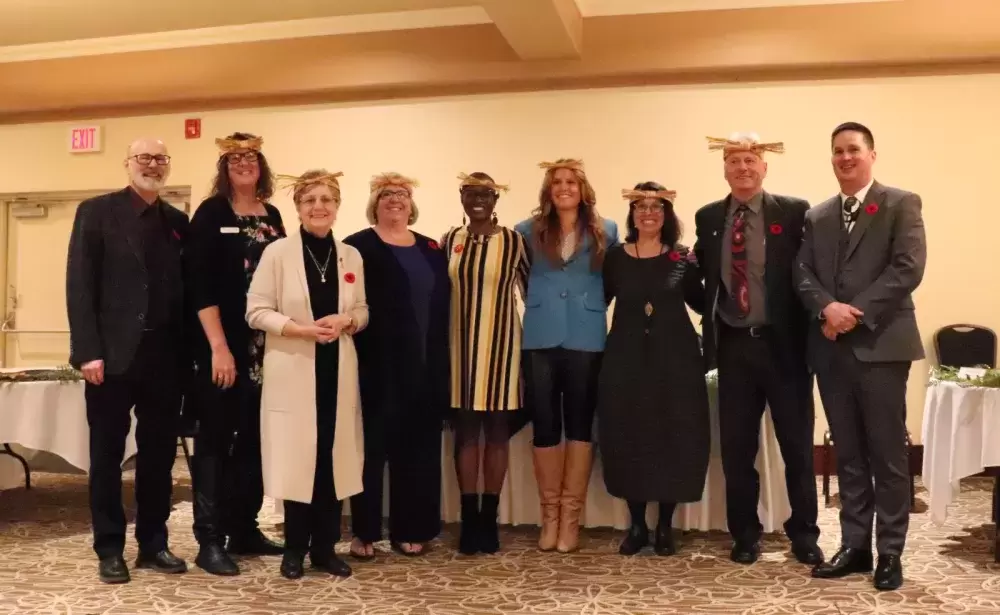On Nov. 8 the Pacific Rim School District (SD 70) hosted the inaugural Board of Education meeting, bringing together community members and representatives from across the district.
The evening was woven with Tseshaht cultural protocol alongside the formal proceedings of the board, which carried several motions that signify SD 70’s commitment to Indigenous learners.
Tseshaht member Ed Ross (Nasimius), was in attendance at the meeting, and was one of the singers at the event.
“It was super important for us to come here today to be able to educate, to help people understand who we are,” said Ross. “It was so respectful of how School District 70 came knocking on our door wanting, wanting this, wanting our culture to be infused.”
Tim Davie, superintendent for School District 70, said that it was important that the district acknowledge the ha’houlthee its buildings reside on.
“This evening's events really [are a] recognition in terms of exchange and learning of cultural traditions,” said Davie.
Davie said the evening also acknowledged SD 70’s commitment to the relationships they have and will continue to build with Nuu-chah-Nulth nations.
As formal proceedings of the meeting began, Lindsay Cheetham, secretary-treasurer, led elected trustees in their Oath of Office for Trustee Code of Conduct.
Trustees for School District 70 include Janis Joseph, Pam Craig, Christine Washington, Larry Ransom, Cherilyn Bray, Helen Zanette, and Cynthia Orr. The meeting nominated and elected official positions the trustees would assume for their four-year term.
During the formal proceedings several motions were carried that would direct Davie in his role as superintendent of schools.
These motions include working toward a district framework for truth and reconciliation inclusive of UNDRIP. The superintendent is also tasked with research and recommendations for co-governance with First Nations, the establishment of an elders council, reporting on addressing the achievement rate gaps for Indigenous students, the development a board strategic plan to be implemented for the next four years, making a board work plan for the remainder of the school year, and development an enhancement agreement with local Indigenous partners. The enhancement agreement would also involve the Alberni Clayoquot Métis Society, Port Alberni Friendship Center, and the Ministry of Education and Childcare.
Many of these various motions are in collaboration with local Indigenous nations and representatives, organizations, and broader communities.
“The board is taking the right steps by looking at true collaboration and bringing our partners to the table with them in terms of decision making,” said Davie.
Tseshaht Elected Chief Ken Watts presented devil's club to the former superintendent of schools and the board of education last spring. The devils club stick is symbolic of a commitment to do better for Indigenous learners in SD 70, said Davie.
When Davie assumed his role as superintendent of schools on Aug. 1, he found the devils club on his desk. He now takes the stick with him to meetings with local nations signifying the continued commitment to Indigenous learners.
According to data collected by the school district, Aboriginal students have shown marked progress in recent years – but results remain behind that of the general population of learners. In 2021 the high school completion rate, which is the proportion of students who graduate within six years of entering Grade 8, was 75 per cent for SD70’s Indigenous students. This rate has increased from the 56 per cent completion rate reported in 2016, but remained 10 points behind the overall completion rate of 85 per cent in 2021.
Literacy assessments before Indigenous students graduate have also improved over the last five years, rising from 43 to 55 per cent proficiency in 2021, while SD70’s overall rate was reported as 66 per cent proficient.
“We have to do more in terms of helping our Indigenous students in their achievements. We do have a gap within the district, and I acknowledge that as the Superintendent,” said Davie to the audience as he held a gifted devils club from the Tseshaht First Nation. “Particularly those students that are living on reserve.”
Davie said that the evening’s events were significant steps towards reconciliation. He noted that the board’s commitment to reconciliation was reflected in the motions that were carried during the evening.
“This commitment that was made tonight really signifies who this board is, and what the work is going to be over the next four years,” said Davie.

